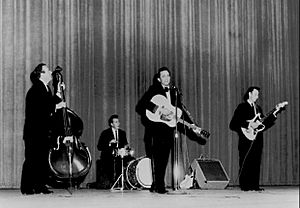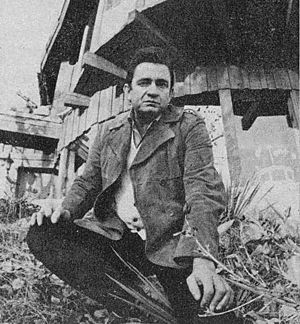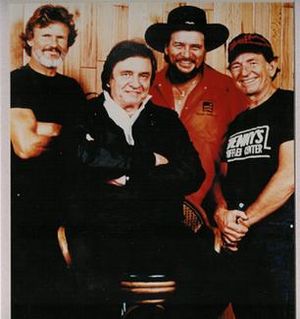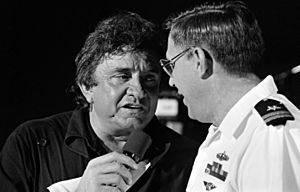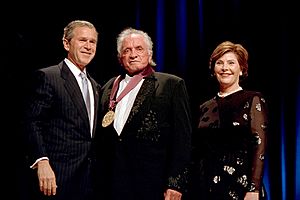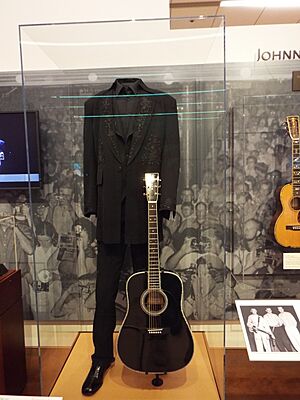Johnny Cash facts for kids
Quick facts for kids
Johnny Cash
|
|
|---|---|
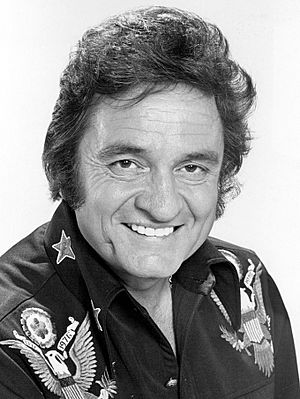
Cash in 1977
|
|
| Born |
J. R. Cash
February 26, 1932 Kingsland, Arkansas, U.S.
|
| Died | September 12, 2003 (aged 71) Nashville, Tennessee, U.S.
|
| Resting place | Hendersonville Memory Gardens |
| Other names | The Man in Black |
| Occupation |
|
| Years active | 1954–2003 |
| Spouse(s) |
|
| Children | 5, including Rosanne, Cindy and John |
| Relatives | Tommy Cash (brother) |
| Military career | |
| Allegiance | United States |
| Service/ |
United States Air Force |
| Years of service | 1950–1954 |
| Rank | |
| Musical career | |
| Genres |
|
| Instruments |
|
| Labels | |
Johnny Cash (born J. R. Cash; February 26, 1932 – September 12, 2003) was a famous American country singer and songwriter. Many of his songs talked about tough times, challenges, and finding hope. He was known for his deep, calm voice and the unique sound of his band, The Tennessee Three. They played guitar rhythms that sounded like a train.
Cash was also known for his rebellious spirit, his free concerts in prisons, and always wearing black clothes on stage. This earned him the nickname "Man in Black". He was born to poor cotton farmers in Kingsland, Arkansas. He became famous in the mid-1950s in Memphis, Tennessee, after serving in the Air Force.
He usually started his concerts by saying, "Hello, I'm Johnny Cash." Then he would play "Folsom Prison Blues", one of his most famous songs. Other well-known songs include "I Walk the Line", "Ring of Fire", and "A Boy Named Sue". He also sang fun songs and many railroad songs. Later in his career, he covered songs by rock artists like "Hurt" by Nine Inch Nails.
Johnny Cash is one of the best-selling music artists ever, selling over 90 million records. His music mixed country, rock and roll, blues, folk, and gospel sounds. He is one of the few artists inducted into the Country Music, Rock and Roll, and Gospel Music Halls of Fame. His life story was made into a movie in 2005 called Walk the Line, starring Joaquin Phoenix as Cash.
Contents
Early Life and Music Beginnings
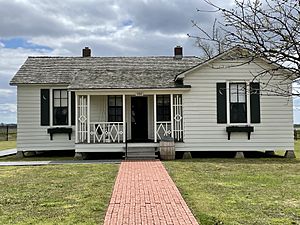
Johnny Cash was born J. R. Cash on February 26, 1932, in Kingsland, Arkansas. His parents were Carrie and Ray Cash. He had six siblings, including his younger brother Tommy, who also became a country singer. His parents wanted to name him John and Ray, so they agreed on J. R. When he joined the Air Force, he had to use a full first name, so he chose John R. Cash. Later, when he signed with Sun Records in 1955, he started using Johnny Cash.
In 1935, when Cash was three, his family moved to Dyess, Arkansas. This was a special community set up to help poor families own land. From age five, he worked in cotton fields with his family, singing as they worked. A flood on their farm inspired his song "Five Feet High and Rising". His family's struggles during the Great Depression made him care deeply about people who were poor or working hard. This inspired many of his songs.
In 1944, his older brother Jack died in a work accident. Cash felt very sad about this and often spoke of meeting his brother again in Heaven.
Cash grew up listening to gospel music and the radio. His mother and a friend taught him to play guitar. He started writing songs at age 12. In high school, he sang on a local radio station. He later released an album of gospel songs called My Mother's Hymn Book.
Serving in the Air Force
Cash joined the Air Force on July 7, 1950. He trained in Texas and then was sent to Landsberg, West Germany. He worked as a Morse code operator, listening to Soviet Army messages. While in Germany, he formed his first band, "The Landsberg Barbarians". He was honorably discharged as a staff sergeant on July 3, 1954.
Music Career Takes Off
In 1954, Cash moved to Memphis, Tennessee. He worked selling appliances and studied to be a radio announcer. At night, he played music with guitarist Luther Perkins and bassist Marshall Grant. They were known as the Tennessee Two. Cash wanted a recording contract, so he visited Sun Records studio.
He first sang gospel songs for producer Sam Phillips, but Phillips wanted different music. Cash then impressed Phillips with his early rockabilly style. In 1955, Cash recorded his first songs, "Hey Porter" and "Cry! Cry! Cry!". These songs became popular on the country music charts.
On December 4, 1956, Elvis Presley visited the studio while Carl Perkins and Jerry Lee Lewis were recording. Cash was also there, and the four started playing music together. This famous jam session was later called the Million Dollar Quartet.
Cash's song "Folsom Prison Blues" became a top five country hit. His song "I Walk the Line" reached number one on the country charts and was also popular on pop charts. In 1957, Cash was the first Sun artist to release a full-length album. Even though he was selling a lot of records, Cash felt limited by his contract with Sun Records.
In 1958, Cash signed a new deal with Columbia Records. His song "Don't Take Your Guns to Town" became a big hit. He also recorded a gospel album for Columbia.
The "Man in Black" Image
Early in his career, other artists jokingly called Cash "the Undertaker" because he always wore black. He said he chose black clothes because they were easy to keep clean on long tours. He also liked wearing black on and off stage.
By the early 1970s, Cash was known as the "Man in Black". He wore all-black suits, which was different from the flashy, rhinestone suits many country singers wore. Cash said he wore black to represent the poor and hungry.
Prison Concerts
Cash started performing concerts in prisons in the late 1950s. His first famous prison concert was on January 1, 1958, at San Quentin State Prison. These shows led to two very successful live albums: Johnny Cash at Folsom Prison (1968) and Johnny Cash at San Quentin (1969). Both albums were number one on the country charts. Johnny Cash at San Quentin also topped the pop album charts. In 1969, Cash became a huge international star, selling more albums than even The Beatles.
The Folsom Prison album started with "Folsom Prison Blues". The San Quentin album included the hit song "A Boy Named Sue", which reached number one on country charts and number two on pop charts. Cash also performed at a prison in Sweden in 1972, and that concert was released as the album På Österåker.
Helping Native Americans
Johnny Cash used his fame to bring attention to issues faced by Native Americans. He sang songs about their struggles, which was unusual for country music at the time.
In 1964, he released the album Bitter Tears: Ballads of the American Indian. This album told stories of different Indigenous peoples and their unfair treatment by white settlers. The songs included "The Ballad of Ira Hayes" and "Navajo". Many of these protest songs were written by folk artist Peter La Farge, whom Cash admired.
Radio stations were hesitant to play "The Ballad of Ira Hayes" because it was seen as too political. Cash fought back, even placing an advertisement in Billboard magazine, calling the music industry "cowardly". He promoted the song himself, and it eventually reached number three on the country charts.
Later, on The Johnny Cash Show, he continued to share stories about Native American challenges through songs and short films. In 1966, the Seneca Nation's Turtle Clan adopted Cash because of his activism. He also performed benefit concerts to help build a school at the Rosebud Reservation, near the site of the Wounded Knee Massacre.
Television and Later Career
The Johnny Cash Show
From 1969 to 1971, Johnny Cash had his own television show, The Johnny Cash Show, on the ABC network. The show was filmed in Nashville. The Statler Brothers, the Carter Family, and Carl Perkins were regular performers. Cash also invited many famous guests, including Linda Ronstadt, Neil Young, Louis Armstrong, Neil Diamond, and Bob Dylan.
Cash had met Dylan in the mid-1960s and they became neighbors. Cash was excited to introduce Dylan to his audience. They sang a duet, "Girl from the North Country", on Dylan's album Nashville Skyline. Another artist who got a big boost from the show was Kris Kristofferson, who was just starting his career as a singer-songwriter.
The Highwaymen and New Music
In 1980, Cash became the youngest living person inducted into the Country Music Hall of Fame at age 48. In the mid-1980s, he formed a supergroup called The Highwaymen with Waylon Jennings, Willie Nelson, and Kris Kristofferson. They released three successful albums together.
Cash also appeared in several TV movies during this time. In 1981, he starred in The Pride of Jesse Hallam, playing a man learning to read. In 1985, he played the historical figure John Brown in the TV miniseries North and South.
In 1986, Cash returned to Sun Studios in Memphis to record the album Class of '55 with Roy Orbison, Jerry Lee Lewis, and Carl Perkins. He also published his only novel, Man in White, about Saul from the Bible.
American Recordings Series
After leaving Columbia Records, Cash signed with Mercury Records for a short time. His career was then revived in the 1990s when he signed with Rick Rubin's American Recordings label. This label was known for rap and hard rock music.
Under Rubin's guidance, Cash recorded American Recordings (1994) in his living room, just with his guitar. The album included covers of songs by modern artists. It was a big success and won a Grammy Award. Cash felt his performance at the 1994 Glastonbury Festival was a highlight of his career.
Cash and his wife, June, appeared in several episodes of the TV series Dr. Quinn, Medicine Woman. He also voiced the "Space Coyote" in an episode of The Simpsons.
In 1996, Cash worked with Tom Petty and the Heartbreakers on Unchained, which won a Grammy for Best Country Album. He also wrote another autobiography, Cash: The Autobiography, in 1997.
Later Years and Legacy
In 1997, Johnny Cash was diagnosed with a serious health condition that affected his movement. This illness made it difficult for him to tour.
He continued to record albums, including American III: Solitary Man (2000) and American IV: The Man Comes Around (2002). American IV featured famous cover songs like "Hurt" by Nine Inch Nails. The music video for "Hurt" was highly praised and won a Grammy Award.
His wife, June Carter Cash, passed away on May 15, 2003. June had encouraged him to keep working, so he continued to record songs. He completed 60 songs in the last four months of his life.
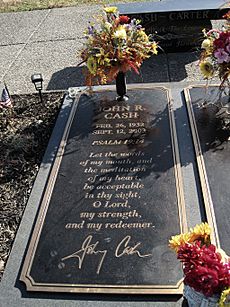
Johnny Cash died on September 12, 2003, at age 71, due to complications from diabetes. He was buried next to June in Hendersonville, Tennessee.
Personal Life
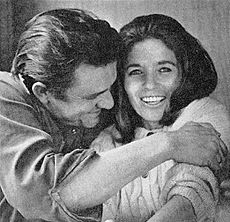
On July 18, 1951, while in the Air Force, Cash met Vivian Liberto. They wrote many letters while he was in Germany. They married on August 7, 1954, and had four daughters: Rosanne, Kathy, Cindy, and Tara. They later divorced.
Cash met June Carter of the famous Carter Family while on tour. They became very close. In 1968, Cash proposed to June during a live performance. They married on March 1, 1968, and had one son together, John Carter Cash, born in 1970. Cash also became a stepfather to June's two daughters from previous marriages. Cash and June worked, made music, and toured together for 35 years until June's death in 2003.
Religious Beliefs
Cash was raised in the Southern Baptist Christian faith. He was baptized in 1944. He was a deeply religious person, even though he faced many personal challenges.
In the mid-1970s, Cash and June studied the Bible and visited Israel. He was also ordained as a minister and performed his daughter's wedding. He often performed at Billy Graham Crusades, which are large Christian gatherings.
Cash recorded several gospel albums and even a spoken-word recording of the entire New King James Version of the New Testament. He often said he was "the biggest sinner of them all" and saw himself as a complex person.
Johnny Cash's Impact
Johnny Cash supported other artists, like Bob Dylan, who were different from typical country music. He was a symbol of country music but also influenced many other music styles. In 1999, many different artists, including Dylan and U2, performed a tribute concert for him.
He wrote over 1,000 songs and released many albums. After he died, a special collection of unreleased music called Unearthed was released.
Cash received many awards throughout his career. In 1999, he got the Grammy Lifetime Achievement Award. Rolling Stone magazine ranked him among the "100 Greatest Artists of All Time". His albums At Folsom Prison and American Recordings are considered some of the greatest albums ever.
Cash supported SOS Children's Villages, which helps children in need. His family asked fans to donate to a memorial fund in his name.
In 2006, Cash's lakeside home in Hendersonville, Tennessee, was sold to Bee Gees singer Barry Gibb. Sadly, the house was completely destroyed by a fire during renovations in 2007.
Two more albums of his recordings with Rick Rubin were released after his death: American V: A Hundred Highways (2006) and American VI: Ain't No Grave (2010).
The main street in Hendersonville, Tennessee, is named "Johnny Cash Parkway". A new Johnny Cash Museum opened in downtown Nashville in 2013.
In 2007, a festival was held in Starkville, Mississippi, where Cash had been arrested many years earlier. The incident inspired his song "Starkville City Jail". The festival honored his life and music.
Johnny Cash's private tour bus, JC Unit One, is now on display at the Rock and Roll Hall of Fame and Museum in Cleveland, Ohio. In 2013, a special Forever stamp honoring Cash was released.
In 2014, the Johnny Cash Trail opened in Folsom, California. It features art that tells the story of Johnny Cash and his connection to Folsom Prison. In 2015, a new type of black tarantula found near Folsom Prison was named Aphonopelma johnnycashi in his honor.
In 2018, his childhood home in Dyess was added to the National Register of Historic Places. The Arkansas Country Music Awards gave Johnny Cash a Lifetime Achievement award in 2018. In 2019, the state of Arkansas announced that a statue of Cash would be placed in the National Statuary Hall to represent the state's modern history.
Portrayals in Media
In 2005, a movie about Cash's life, Walk the Line, was released. Joaquin Phoenix played Johnny Cash, and Reese Witherspoon played June Carter. Both actors sang their own songs in the movie and won awards for their performances. John Carter Cash, Johnny and June's son, helped produce the film.
A musical called Million Dollar Quartet also tells the story of early recording sessions with Cash, Elvis Presley, Jerry Lee Lewis, and Carl Perkins.
Awards and Honors
Johnny Cash received many awards, including Country Music Association Awards and Grammys. He was a huge influence on country music and many other genres.
He is honored in five major music halls of fame:
- Nashville Songwriters Hall of Fame (1977)
- Country Music Hall of Fame (1980)
- Rock and Roll Hall of Fame (1992)
- GMA's Gospel Music Hall of Fame (2010)
- Memphis Music Hall of Fame (2013)
He received the Kennedy Center Honors in 1996 and the National Medal of Arts in 2001. His music video for "Hurt" was nominated for six MTV Video Music Awards in 2003. Johnny Cash became the oldest artist ever nominated for an MTV Video Music Award.
Discography
- Johnny Cash with His Hot and Blue Guitar! (1957)
- The Fabulous Johnny Cash (1958)
- Hymns by Johnny Cash (1959)
- Songs of Our Soil (1959)
- Now, There Was a Song! (1960)
- Ride This Train (1960)
- Hymns from the Heart (1962)
- The Sound of Johnny Cash (1962)
- Blood, Sweat and Tears (1963)
- The Christmas Spirit (1963)
- Keep on the Sunny Side (with the Carter Family) (1964)
- I Walk the Line (1964)
- Bitter Tears: Ballads of the American Indian (1964)
- Orange Blossom Special (1965)
- Johnny Cash Sings the Ballads of the True West (1965)
- Everybody Loves a Nut (1966)
- Happiness Is You (1966)
- Carryin' On with Johnny Cash & June Carter (with June Carter) (1967)
- From Sea to Shining Sea (1968)
- The Holy Land (1969)
- Hello, I'm Johnny Cash (1970)
- Man in Black (1971)
- A Thing Called Love (1972)
- America: A 200-Year Salute in Story and Song (1972)
- The Johnny Cash Family Christmas (1972)
- Any Old Wind That Blows (1973)
- Johnny Cash and His Woman (with June Carter Cash) (1973)
- Ragged Old Flag (1974)
- The Junkie and the Juicehead Minus Me (1974)
- The Johnny Cash Children's Album (1975)
- Johnny Cash Sings Precious Memories (1975)
- John R. Cash (1975)
- Look at Them Beans (1975)
- One Piece at a Time (1976)
- The Last Gunfighter Ballad (1977)
- The Rambler (1977)
- I Would Like to See You Again (1978)
- Gone Girl (1978)
- Silver (1979)
- A Believer Sings the Truth (1979)
- Johnny Cash Sings with the BC Goodpasture Christian School (1979)
- Rockabilly Blues (1980)
- Classic Christmas (1980)
- The Baron (1981)
- The Adventures of Johnny Cash (1982)
- Johnny 99 (1983)
- Highwayman (with Waylon Jennings, Willie Nelson & Kris Kristofferson) (1985)
- Rainbow (1985)
- Heroes (with Waylon Jennings) (1986)
- Class of '55 (with Roy Orbison, Jerry Lee Lewis & Carl Perkins) (1986)
- Believe in Him (1986)
- Johnny Cash Is Coming to Town (1987)
- Classic Cash: Hall of Fame Series (1988)
- Water from the Wells of Home (1988)
- Boom Chicka Boom (1990)
- Highwayman 2 (with Waylon Jennings, Willie Nelson & Kris Kristofferson) (1990)
- The Mystery of Life (1991)
- Country Christmas (1991)
- American Recordings (1994)
- The Road Goes on Forever (with Waylon Jennings, Willie Nelson & Kris Kristofferson) (1995)
- American II: Unchained (1996)
- American III: Solitary Man (2000)
- American IV: The Man Comes Around (2002)
- My Mother's Hymn Book (2004)
- American V: A Hundred Highways (2006)
- American VI: Ain't No Grave (2010)
- Out Among the Stars (2014)
Filmography
Film
| Year | Title | Role | Notes |
|---|---|---|---|
| 1961 | Five Minutes to Live | Johnny Cabot | Also titled Door-To-Door Maniac |
| 1967 | The Road to Nashville | Himself | |
| 1971 | A Gunfight | Abe Cross | |
| 1973 | Gospel Road: A Story of Jesus | Narrator/Himself | |
| 1983 | Kairei | Uncle John | Japanese film |
| 1994 | Gene Autry, Melody of the West | Narrator | Documentary film; voice acting role |
| 2003 | The Hunted | Narrator | Voice acting role |
| 2014 | The Winding Stream | Interview subject | Documentary film; archive footage |
Television
| Year | Title | Role | Notes |
|---|---|---|---|
| 1959 | Shotgun Slade | Sheriff | Episode: "The Stalkers" |
| 1959 | Wagon Train | Frank Hoag | Episode: "The C.L. Harding Story |
| 1960 | The Rebel | Pratt | Episode: "The Death of Gray" |
| 1961 | The Deputy | Bo Braddock | Episode: "The Deathly Quiet" |
| 1969–1971 | The Johnny Cash Show | Himself – host and performer | 58 episodes |
| 1970 | NET Playhouse | John Ross | Episode: "Trail of Tears" |
| 1970 | The Partridge Family | Variety Show Host | Episode: "What? Get Out of Show Business?" |
| 1973–1992 | Sesame Street | Himself | 4 episodes |
| 1974–1988 | Hee Haw | Himself | 4 episodes |
| 1974 | Columbo | Tommy Brown | Episode: "Swan Song" |
| 1974 | Johnny Cash Ridin' the Rails—The Great American Train Story | Himself | |
| 1976 | Johnny Cash and Friends | Himself | 4 episodes |
| 1976 | Little House on the Prairie | Caleb Hodgekiss | Episode: "The Collection" |
| 1976–1985 | Johnny Cash specials (various titles) | Himself | 15 specials |
| 1978 | Thaddeus Rose and Eddie | Thaddeus Rose | Television film |
| 1978 | Steve Martin: A Wild and Crazy Guy | Himself | Television special |
| 1980 | The Muppet Show | Himself | Episode: "#5.21" |
| 1981 | The Pride of Jesse Hallam | Jesse Hallam | Television film |
| 1982 | Saturday Night Live | Himself | Episode: "Johnny Cash/Elton John" |
| 1983 | Murder in Coweta County | Lamarr Potts | Television film; also producer |
| 1984 | The Baron and the Kid | The Baron Will |
Television film |
| 1985 | North and South | John Brown | 6 episodes |
| 1986 | The Last Days of Frank and Jesse James | Frank James | Television film |
| 1986 | Stagecoach | Curly Wilcox | Television film |
| 1988 | The Magical World of Disney | Elder Davy Crockett | Episode: "Rainbow in the Thunder" |
| 1993–1997 | Dr. Quinn, Medicine Woman | Kid Cole | 4 episodes |
| 1996 | Renegade | Henry Travis | Episode: "The Road Not Taken" |
| 1997 | The Simpsons | Space Coyote | Episode: "El Viaje Misterioso de Nuestro Jomer (The Mysterious Voyage of Homer)"; voice acting role |
| 1998 | All My Friends Are Cowboys | Himself | Television special |
| 2014 | Johnny Cash: The Man, His World, His Music | Himself | Television film; BBC Bio Documentary by Robert Elfstrom; archive footage |
Published Works
- Man in Black: His Own Story in His Own Words, Zondervan, 1975; ISBN: 99924-31-58-X
- Man in White, a novel about the Apostle Paul, HarperCollins, 1986; ISBN: 0-06-250132-1
- Cash: The Autobiography, with Patrick Carr, HarperCollins, 1997; ISBN: 978-0-06-101357-7
- Johnny Cash Reads the New Testament, Thomas Nelson, 2011; ISBN: 978-1-4185-4883-4
- Recollections by Johnny Cash, edited by daughter Tara, 2014; ISBN: 978-0-930677-03-9
- The Man Who Carried Cash: Saul Holiff, Johnny Cash, and the Making of an American Icon by Julie Chadwick, Dundurn Press, 2017; ISBN: 978-1-459737-23-5
See also
 In Spanish: Johnny Cash para niños
In Spanish: Johnny Cash para niños
 | Selma Burke |
 | Pauline Powell Burns |
 | Frederick J. Brown |
 | Robert Blackburn |


